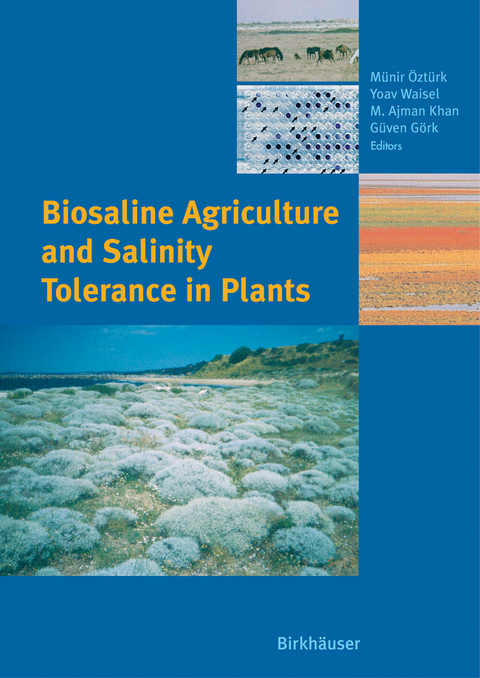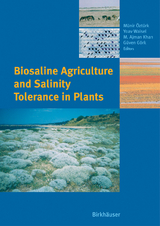Biosaline Agriculture and Salinity Tolerance in Plants
Springer Basel (Verlag)
978-3-7643-7609-3 (ISBN)
The availability of freshwater for agricultural use is declining in many areas of the world. This is the reason for the increasing use of lower quality or of saline water for crop production. Prolonged use of saline water severely affects the irrigated soils, which contributes to the global land degradation process and has direct impact on biomass production.
For this reason, reduction of the spread of salinization, revitalization of salinized areas and introduction of salt tolerant high-yielding crops are important issues. The potential role of halophytes in the management of salinity problems of arid lands is investigated at length nowadays; some of these produced promising forage crops.
This volume focuses on reclamation, management, and utilization of salt-affected soils, their sustainable use, and evaluation of plants inhabiting naturally occurring saline habitats. It is of interest to scientists and students as well as to agricultural institutions and farmers and will undoubtedly raise the scientific community's awareness of, and interest in salinity issues.
The availability of freshwater for agricultural use is declining in many areas of the world. This is the reason for the increasing use of lower quality or of saline water for crop production. Prolonged use of saline water severely affects the irrigated soils, which contributes to the global land degradation process and has direct impact on biomass production. For this reason, reduction of the spread of salinization, revitalization of salinized areas and introduction of salt tolerant high-yielding crops are important issues. The potential role of halophytes in the management of salinity problems of arid lands is investigated at length nowadays; some of these produced promising forage crops. This volume focuses on reclamation, management, and utilization of salt-affected soils, their sustainable use, and evaluation of plants inhabiting naturally occurring saline habitats. It is of interest to scientists and students as well as to agricultural institutions and farmers and will undoubtedly raise the scientific community's awareness of, and interest in salinity issues.
Physiological aspects.- Effects of salinity on rhizosphere bacterial communities associated with different root types of Vicia faba L..- Tolerance of some potential forage grasses from arid regions of Pakistan to salinity and drought.- Salt and seawater effects on the germination of Crithmum maritimum.- Growth performance and nutritional value of salt tolerant plants growing under saline environments.- Comparative effect of NaCl and seawater on seed germination of Suaeda salsa and Atriplex centralasiatica.- Salt effect on growth, photosynthesis, seed yield and oil composition of the potential crop halophyte Cakile maritima.- Effect of nitrogen deficiency, salinity and drought on proline metabolism in Sesuvium portulacastrum.- Linkage studies of structure, isoenzymatic diversity and some biotechnological procedures for Salsola species under desert saline environments.- Kinetics of the antioxidant response to salinity in Crithmum maritimum.- Ecological aspects.- An overview of the coastal zone plant diversity and management strategies in the mediterranean region of Turkey.- Saline and alkaline vegetation of NE Africa and the Arabian peninsula: An overview.- Vegetation zones in the salty marshes of Central Anatolia and natural borders of agricultural usage (Turkey).- Agricultural aspects.- Halophytes as cash crops for animal feeds in arid and semi-arid regions.- Potential of dry drainage as a sustainable solution to waterlogging and salinisation.- Vegetative bioremediation of sodic and saline-sodic soils for productivity enhancement and environment conservation.- Bio-reclamation of secondary salinized soils using halophytes.- Effects of irrigation water salinity on yield and evapotranspiration of drip irrigated cucumber in a semiarid environment.- Potential utilisation ofhalophytes for the rehabilitation and valorisation of salt-affected areas in Tunisia.- Interactive effect of potash and organic manures on growth and nutrient uptake of sugarcane grown under saline conditions.- The effects of saline irrigation water by drip irrigation on salt distribution in soil.
| Erscheint lt. Verlag | 18.5.2006 |
|---|---|
| Zusatzinfo | XVIII, 206 p. |
| Verlagsort | Basel |
| Sprache | englisch |
| Maße | 210 x 297 mm |
| Gewicht | 650 g |
| Themenwelt | Naturwissenschaften ► Biologie ► Botanik |
| Naturwissenschaften ► Biologie ► Ökologie / Naturschutz | |
| Weitere Fachgebiete ► Land- / Forstwirtschaft / Fischerei | |
| Schlagworte | Agriculture • Bacteria • Environment • Halophytes • Hardcover, Softcover / Biologie/Ökologie • HC/Biologie/Ökologie • Kali • nitrogen • Pflanzen • photosynthesis • plant ecology • quality • Salinity Tolerance • Soil • Transpiration • Vegetation |
| ISBN-10 | 3-7643-7609-0 / 3764376090 |
| ISBN-13 | 978-3-7643-7609-3 / 9783764376093 |
| Zustand | Neuware |
| Haben Sie eine Frage zum Produkt? |
aus dem Bereich




